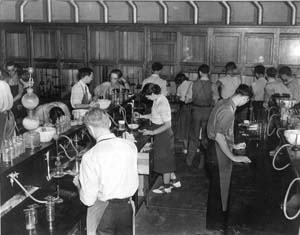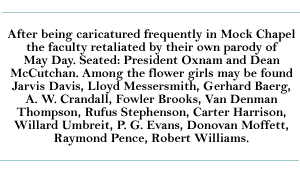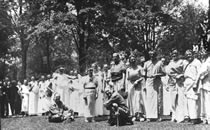
|
Pages: << Back 1 2 3 4 5 6 7 8 9 10 Next >> Senior Week became a DePauw institution in the late 1920s and early 1930s. It consisted of a series of chapel programs, the first of which was "coming out" day for seniors, who wore caps and gowns for the first time, after securing them against theft by underclassmen. The president or a favorite professor addressed the assembled student body in Meharry Hall, the juniors and sophomores occupying their assigned places behind the black-garbed seniors on the main floor. Men and women were still separated on either side of the room, and freshmen sat in the balcony, the normal practice in daily chapel.
One or two days were given to recognition chapel, when awards for
athletic and scholastic excellence were presented and elections
to senior honoraries announced. The Old Gold Gown was passed down
from the senior woman holding it to the junior woman chosen for
that honor. Senior men of Blue Key-later Gold Key-solemnly tapped
new initiates from the junior class with the cane that served as
their badge of office. The climax came with the presentation of
the Walker Cup, given to the university in 1926 by alumnus Guy Morrison
Walker and originally awarded at Commencement time, to the senior
deemed to have contributed the most to DePauw. This high honor,
the recipients of which were chosen jointly by vote of the senior
class, and the faculty, went only to males until 1941.
But
for many the high point of Senior Week was the mock chapel which
took place on Friday morning. With the entire faculty occupying
the front rows of Meharry Hall, members of the senior class appeared
on stage performing skits intended to caricature certain prominent
administrators and professors. The more successful performances
evoked howls of appreciative laughter from the students and a few
smiles and an occasional frown from the subjects of the skits. On
one occasion President Oxnam and some of the most often-caricatured
members of the faculty retaliated by staging their own parody of
the annual May Day festivities. Decked out in flowing gowns and
garlanded with flowers, they marched into chapel impersonating the
May Queen and her court before the astonished but delighted student
body. |
Depauw University e-history | E-mail comments to: archives@depauw.edu

 _____________________________________
_____________________________________
